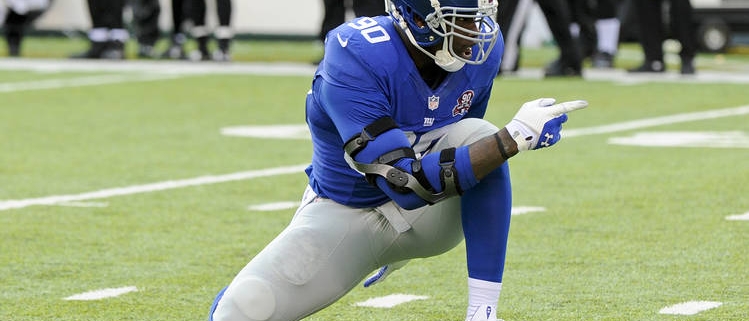Release of Pierre-Paul Medical Records Draws Scrutiny
“We are aware of the incident,” said a spokeswoman for the Health and Human Services’ Office for Civil Rights. She said the office could open a case based on media reports, and has done so in the past. She declined to comment further, saying the office does not release information on “current or potential investigations.”
Pierre-Paul, a 26-year-old defensive end most recently with the New York Giants, wounded his hand in a Fourth of July fireworks accident and sought treatment at Miami’s Jackson Memorial Hospital. On Wednesday evening, a reporter for ESPN posted a photo of what appeared to be an electronic medical record that listed the name “PIERREPAUL, JASON” and the words “RIGHT INDEX FINGER RAY RESECTION,” which indicated he had an operation to amputate the entire finger.
A person close to Pierre-Paul confirmed the operation.
The federal Health Insurance Portability and Accountability Act, or Hipaa, which protects the privacy of individually identifiable health information, generally makes it illegal for health providers to release a patient’s medical records without explicit permission from the patient. It’s unclear whether Pierre-Paul authorized the publication of such information, but a person close to Pierre-Paul said that was unlikely. Pierre-Paul’s agent did not return requests for comment on Thursday.
‘From an ethical point of view, unless he specifically authorized it, it’s a gross transgression of privacy.’
“Late Wednesday, media reports surfaced purportedly showing a Jackson Memorial Hospital patient’s protected health information, suggesting it was leaked by an employee,” said Carlos Migoya, president and chief executive of Jackson Health System, which oversees the Miami hospital treating Pierre-Paul, in a statement Thursday. “An aggressive internal investigation looking into these allegations is underway. If these allegations prove to be true, I know the entire Jackson family will share my anguish.”
The statement, which did not mention Pierre-Paul by name, also said that “we enforce strict rules for those who handle patient information and continually educate all employees on privacy regulations.”
A spokesman for the Florida attorney general also confirmed the agency had learned of the incident from media reports and was in the process of gathering information about it to “better understand” what had happened.
Besides raising questions about a patient’s privacy, the ESPN publication troubled journalists who said the sports network violated an ethical code by publishing a photo of an individual’s medical record.
In a statement, ESPN said: “HIPAA does not apply to news organizations.” An ESPN spokesman on Thursday declined to comment on how it obtained the information, or criticism that it was unethical to publish it.
Journalism and legal experts said ESPN probably didn’t break any medical-privacy laws by publishing Pierre-Paul’s medical records because Hipaa applies to only insurers and the medical professionals who have access to a patient’s personal information.
Individual health professionals and facilities who knowingly obtain or disclose identifiable information are subject to fines of up to $50,000 and up to a year in prison. Fines and prison time can increase—up to 10 years—if the wrongful conduct involves the intent to sell or use the identifiable health information for commercial advantage, personal gain or malicious harm.
Porter said it would be hard to punish a hospital if, say, one of its employees took a snapshot of a medical record. “You can put in all the technical security, but that doesn’t prevent the low-tech activity,” Porter said.
If someone released Pierre-Paul’s medical record without his consent, the football player could sue the person in state court, but not under Hipaa. “They can claim whatever damages they could justify, damage to a person’s reputation,” said Lawrence Gostin, a law professor and faculty director of the O’Neill Institute for National and Global Health Law at Georgetown University.
ESPN is also under fire from legal experts and journalists at other organizations for publishing the photo of Pierre-Paul’s medical record. “From an ethical point of view, unless he specifically authorized it, it’s a gross transgression of privacy,” Gostin said.
Kelly McBride, a journalism ethics expert at the Poynter Institute and a former ESPN ombudsman, said it wasn’t a problem that ESPN reported on Pierre-Paul’s amputation, which was newsworthy. The issue was that ESPN published the photo of his medical record.
“The harm of transmitting or broadcasting someone’s medical documents is you really don’t know what medical information is in there that’s coded in some way,” McBride said. “There could be some other information that isn’t obvious to you about the individual that’s in the medical document. When you make it public, someone who understands that coded information can decode it.”
McBride said that if she were an editor handling the story, she would have pushed the reporter to get more context about the story and she would have published a story that cited information from the medical record—but without publishing the actual record.
Since entering the league in 2010, Pierre-Paul has been one of the NFL’s best defensive ends. A two-time Pro Bowler and one-time Super Bowl champion, he ranked eighth in the league in quarterback sacks last season. He is technically not under contract with the Giants, who essentially hold his rights. The Giants have offered him a one-year, $14.8 million deal that it could rescind.
A Giants spokesman said Thursday that the team was unaware of Pierre-Paul’s amputation before the ESPN report and that its leaders haven’t spoken to Pierre-Paul since the incident; the team sent officials to Miami this week, but they left Wednesday without seeing him. The spokesman declined to comment on the status of the $14.8-million contract offer.
Write to Stu Woo at [email protected] and Louise Radnofsky at [email protected]
Source: Wall Street Journal Health

ENLARGE
New York Giants’ Jason Pierre-Paul reacts to sacking Philadelphia Eagles’ Mark Sanchez during the first half of an NFL football game on Sunday, Dec. 28.
Photo: Associated Press


